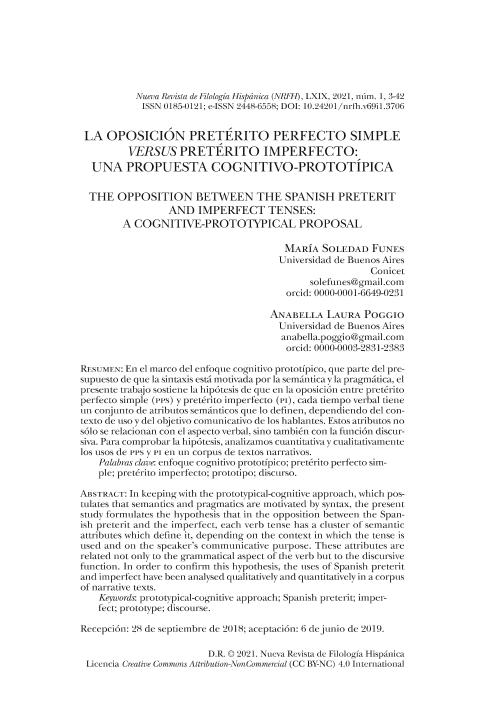Artículo
En el marco del Enfoque Cognitivo Prototípico, que parte del presupuesto de que la Sintaxis está motivada por la Semántica y la Pragmática, el presente trabajo sostiene la hipótesis de que en la oposición pretérito perfecto simple (PPS)-pretérito imperfecto (PI), cada tiempo verbal tiene un conjunto de atributos semánticos que lo definen, dependiendo del contexto de uso y del objetivo comunicativo de los hablantes. Dichos atributos no sólo se relacionan con el aspecto verbal sino también con la función discursiva. Para comprobar la hipótesis, analizamos cuantitativa y cualitativamente los usos de PPS y PI en un corpus de textos narrativos. In keeping with the prototypical-cognitive approach, which postulates that semantics and pragmatics are motivated by syntax, the present study formulates the hypothesis that in the opposition between the Spanish preterit and the imperfect, each verb tense has a cluster of semantic attributes which define it, depending on the context in which the tense is used and on the speaker's communicative purpose. These attributes are related not only to the grammatical aspect of the verb but to the discursive function. In order to confirm this hypothesis, the uses of Spanish preterit and imperfect have been analysed qualitatively and quantitatively in a corpus of narrative texts.
La oposición pretérito perfecto simple versus pretérito imperfecto: Una propuesta cognitivo-prototípica
Título:
The opposition between the spanish preterit and imperfect tenses: A cognitive-prototypical proposal
Fecha de publicación:
01/2021
Editorial:
El Colegio de México. Centro de Estudios Lingüísticos y Literarios
Revista:
Nueva Revista de Filologia Hispanica
ISSN:
0185-0121
e-ISSN:
2448-6558
Idioma:
Español
Tipo de recurso:
Artículo publicado
Clasificación temática:
Resumen
Archivos asociados
Licencia
Identificadores
Colecciones
Articulos(SEDE CENTRAL)
Articulos de SEDE CENTRAL
Articulos de SEDE CENTRAL
Citación
Funes, María Soledad; Poggio, Anabella Laura; La oposición pretérito perfecto simple versus pretérito imperfecto: Una propuesta cognitivo-prototípica; El Colegio de México. Centro de Estudios Lingüísticos y Literarios; Nueva Revista de Filologia Hispanica; 69; 1; 1-2021; 3-42
Compartir
Altmétricas




